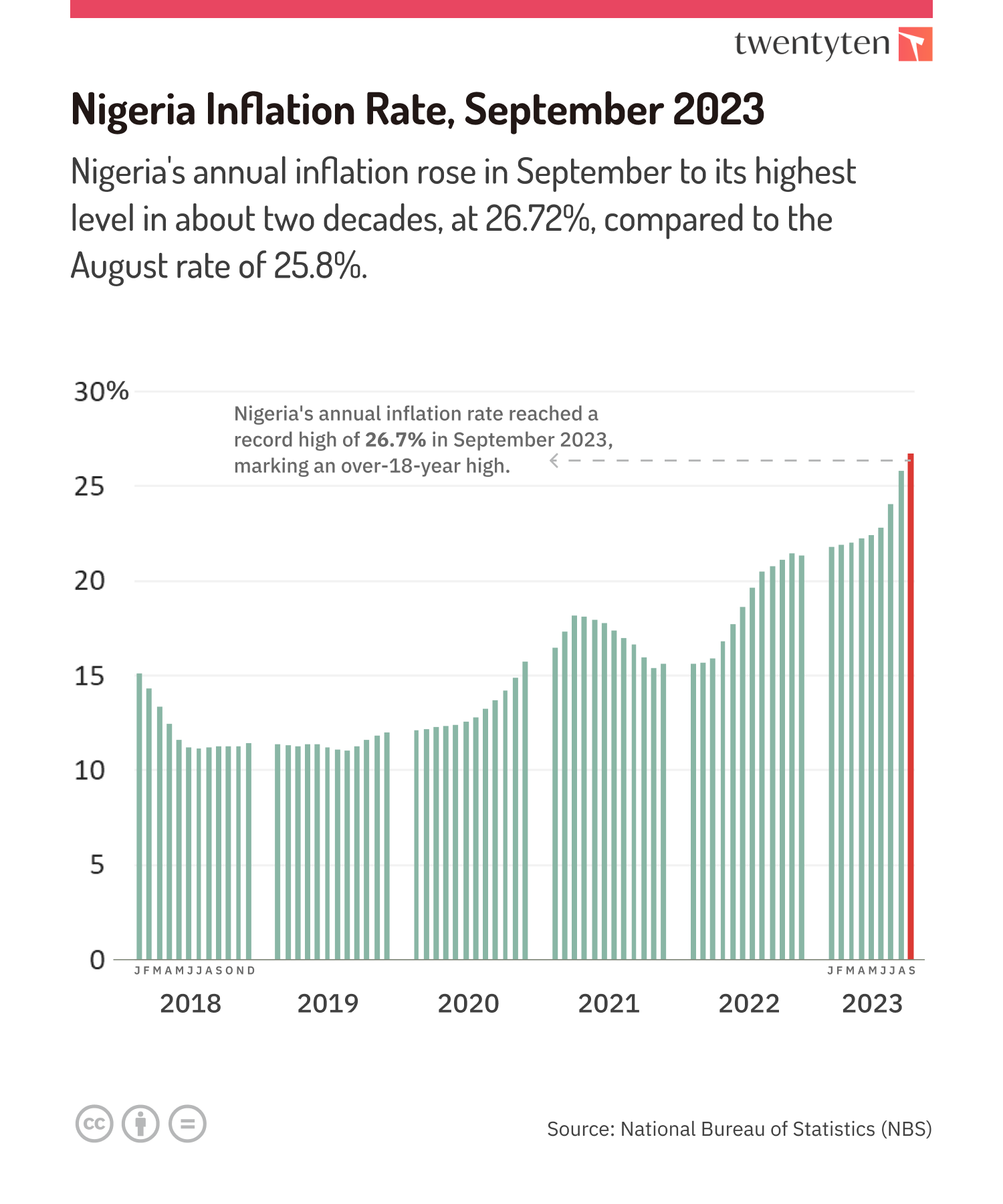Inflation: Nigeria Has Surpassed 16.0% Rate 25 Times In 88 Months
The National Bureau of Statistics has published that the consumer price index for April 2022 increased to 16.82 percent on a year-on-year basis.
The recent figures are 1.3 percent points lower compared to the rate recorded in April 2021 (18.12) percent but 0.9 percent higher than March 2022.
According to NBS the headline inflation rate slowed down in April when compared to the same month in the previous year. Increases were recorded in all COICOP divisions that yielded the Headline index.
NBS said, “on a month-on-month basis, the Headline index increased to 1.76 percent in April 2022, this is a 0.02 percent rate higher than the rate recorded in March 2022 (1.74) percent. The percentage change in the average composite CPI for the twelve months period ending April 2022 over the average of the CPI for the previous twelve months period is 16.45 percent, showing a 0.1 percent decrease compared to the 16.54 percent recorded in March 2022.
“The urban inflation rate increased to 17.35 percent (year-on-year) in April 2022 from 18.68 percent recorded in April 2021, while the rural inflation rate increased to 16.32 percent in April 2022 from 17.57 percent in April 2021.”
Rising Inflation In 2022
Since January 2022, Nigeria has consistently recorded an increase in its inflation rate. This is owing to the several economic challenges including petrol scarcity, persistent insecurity challenges in the northern region; sit-at-home in the eastern part of the country, devaluation in naira and several restriction on Forex transactions.

While these have subsequently changed the prices of goods in the market in 2022, the World Bank commodity analysis showed that the impact of COVID-19 induced inflation in the country pushed 23 million Nigerians into food crises in 2021.
In 2020, the inflation rate in Nigeria grew constantly months-on-month. This progression continued up until April 2021 retrogression. However, after eight months, the rate increased to 15.63 percent in December 2021. This is a 0.20 percent increase over November’s 15.43 percent recorded. Since December 2021, the rate has continued to increase over months. The International Monetary Fund projected, in a tabular illustration in the IMF’s Regional Economic Outlook for Sub-Saharan Africa, that Nigeria’s Consumer Price Index will hit 16.1 per cent in 2022.
The report read in part, “In sub-Saharan Africa, food prices are also the most important channel of transmission, although in slightly different ways. Wheat is a less important part of the diet, but food, in general, is a larger share of consumption.
“Higher food prices will hurt consumers’ purchasing power, particularly among low-income households, and weigh on domestic demand. Social and political turmoil, most notably in West Africa, also weighs on the outlook.”
Highlight of data from 2015
Twentyten Daily looked through the inflation rate from 2015 till April 2022 to identify months that the country had recorded an inflation rate surpassing 16.00 percent. Finding showed that Nigeria has surpassed 16.0 percent inflation rate 25 times within 88 months.
- In 2016, the country recorded over 16.0 percent inflation rate seven times (7months).
- In 2017, eight times (8 months), for 2021 nine times (9 months) and once in 2022.
- In 2016, the inflation rate moved from 16.48 percent in June to 18.55 percent in December.
- In 2017, the inflation rate dropped from 18.72 percent in January to 16.01 percent in August
- In 2021, the inflation rate moved from 16.47 percent in January to 16.63 in September, despite the increases record within the month.
- Within 88 months (2015 to April 2022), the highest inflation rate recorded was 18.72 percent in january 2017 while the lowest is 16.01 percent in August 2017.
- 2022 April’s inflation rate of 16.82 percent is the highest recorded in eight months
Impact on economy
In recent developments, JPMorgan removed Nigeria from its list of emerging market sovereign recommendations that investors should be ‘overweight’ in, saying Nigeria had not taken advantage of high oil prices.
The organization said, “Nigeria’s fiscal woes amid a worsening global risk backdrop have raised market concerns despite a positive oil environment”.
Also, industry experts have called on the Federal Government to take swift and deliberate action to cushion the effects of the disruptions in the global wheat market on Nigeria’s wheat value chain.
According to the experts, the multifaceted value chain crises, including the shortage of foreign exchange, mounting freight charges, and hike in the price of diesel, worsened by the war continue to take a heavy toll on the wheat value chain.



